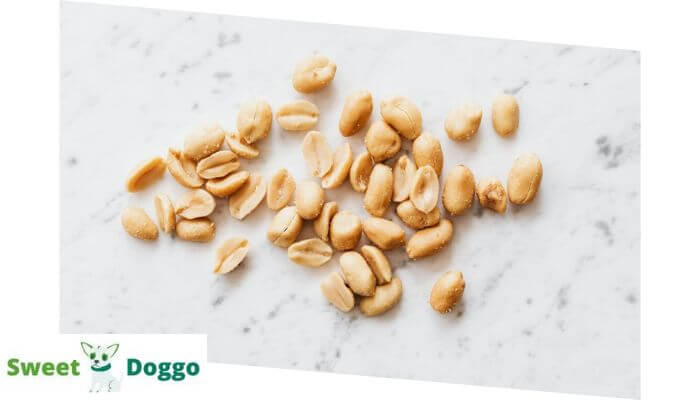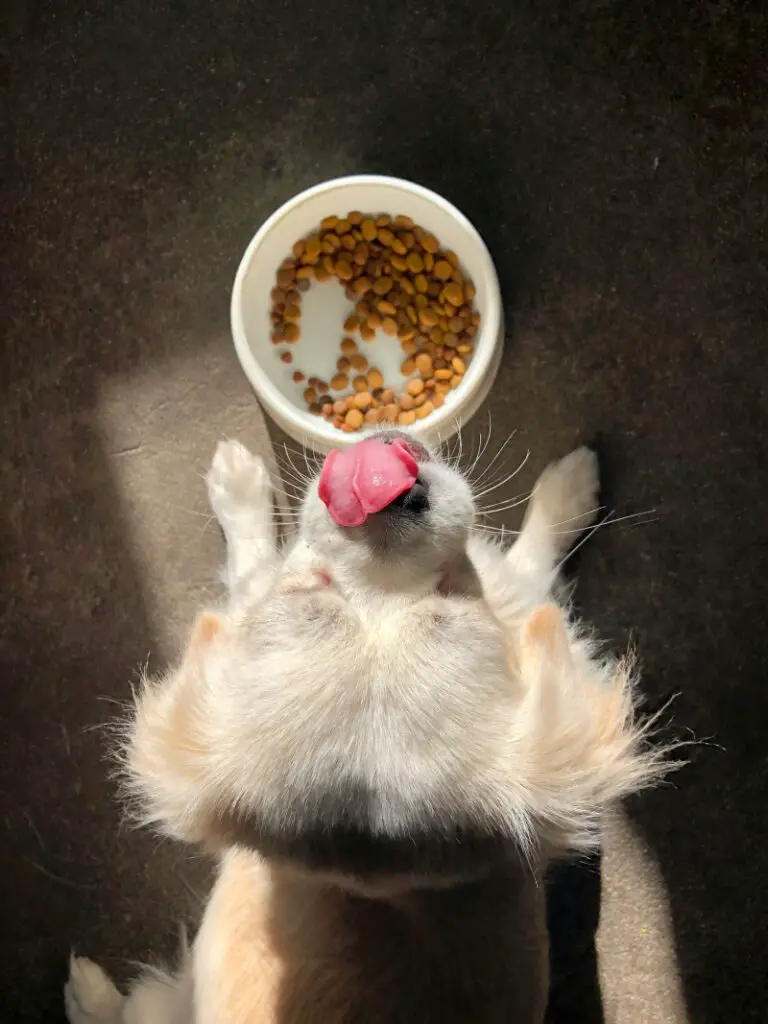It is well known that dogs love peanut butter. And since this is made from peanuts, it’s easy to assume that the nut is also a safe food for our furry friend. But the truth is that it is not that simple. Can dogs eat peanuts? Are peanuts safe for dogs? Are peanuts good for dogs? Why is it said that dogs cannot eat peanuts?
Keep reading on Sweet Doggo to learn everything about dogs and peanuts, their consumption, safe options, associated risks, and expert advice.
Table of Contents
Can dogs eat peanuts?
In general, dogs can eat peanuts. Unlike other nuts, this one is not considered toxic. It is a highly nutritious grain, rich in proteins, good fats, and vitamins (E, group B). However, it is important that a dog only eat it in moderation, preferably as a treat.
Considering that peanuts are high in fat and can be difficult to digest, their excessive or inappropriate consumption can have negative consequences for the health of the pet.
As with any new food, it is always wise to introduce it slowly. This will help determine whether or not it’s a good idea to give it to your dog. If in doubt, it is best to consult a veterinarian first.
Did you know…? Despite being popularly known as a nut, peanuts are not a type of nut, but rather a legume (edible seed that grows inside a pod).
What kind of peanut is safe for my dog?
Peanuts can be safely eaten by dogs, as long as they are raw (in their natural form), or roasted without added salt, sugars, or other flavorings.
How to give peanuts to dogs?
When it comes to dogs and peanuts, there are several forms of consumption that are considered appropriate. These are:
- Natural raw peanut
- Roasted peanuts
- Peanut boiled or cooked
In any case, it is necessary to remove the shell before giving it to the dog, as well as avoid the addition of salt, honey, spices, or other ingredients that are not recommended. Make sure he chews them thoroughly.
Other preparation ways to include peanuts in the canine diet can be processing the grains into your own peanut butter (ground peanuts) or adding them to cookies and other homemade treats.
How many peanuts can dog eat a day?

As we mentioned before, moderation is key.
Limit your dog’s peanut consumption to a small portion (5-6 peanuts), always as a reward or occasional treat. It is not recommended that dogs eat peanuts every day. Being a dry fruit so rich in fat, its regular or excessive consumption can cause stomach problems (diarrhea, vomiting, loss of appetite).
Likewise, it can put the pet at risk of developing pancreatitis.
Note. Your vet can provide information on the safest serving size and frequency of consumption for your dog. The amount of peanut accepted for a large breed dog may not be the same as for a medium or small dog.
Can dogs eat peanut butter safely?
Can dogs eat peanut butter? Peanut butter is a safe food for most dogs. However, not all peanut butter is made equal. As a dog owner, there are several precautions to keep in mind.
The most recommended type of peanut butter for dogs is one that contains only natural roasted peanuts, and possibly a small amount of salt. Regular butter that is high in sodium contains sugar/honey, or is mixed with vegetable oil are not considered good choices for your pet.
A very important precaution in this regard is to avoid any peanut butter that contains xylitol among its ingredients. This artificial sweetener, commonly used in commercial products, is highly toxic to dogs. Even a small amount can be fatal.
Another potentially poisonous ingredient that may be present in some peanut butter is chocolate.
Many owners prefer to make their own homemade peanut butter for dogs.
Like peanuts, butter should be given sparingly. When used sparingly, it can be the perfect additive to provide extra protein, good fats, vitamins, and make a meal more appetizing.
Common uses of peanut butter for dogs
- Administer medications. Hiding the pill inside a small amount of peanut butter is a good trick to get your dog to swallow the medication.
- Encourage entertainment. If the dog enjoys toys, such as the Kong, using peanut butter will make the stuffing more appetizing, sticky, and smelly, and therefore keep the pet entertained for longer.
- Distract in an awkward situation. Because dogs love peanut butter, it can also be a great treat to make your pet feel more comfortable and create positive associations. This is especially helpful during uncomfortable experiences, like taking a shower or cutting your nails.
Recipe: Bacon and peanut butter special dog treat
Ingredients
- 2 cups of oatmeal
- 1 egg
- ½ cup plain peanut butter
- ½ cup unsweetened applesauce
- ½ cup precooked low-sodium bacon (without fat)
Steps
- Preheat oven to 350°F (180°C).
- To a food processor, first, add the bacon and process to obtain a brownish texture.
- Now add the peanut butter, applesauce, egg, and lightly pulse to combine.
- Finally, start adding parts of the oatmeal and pulse to incorporate. Process until a gelatinous mass is obtained.
- Place the dough on a lightly floured board and spread it out with the help of a rolling pin. Cut out the dough with your favorite cookie cutters, preferably ones that are tiny.
- Transfer the sandwiches to a parchment-lined tray and bake for 30 minutes, or until golden brown.
- Let these tasty treats cool down before serving them to your dog.
It may interest you: Can Dogs Eat Banana? Consumption and Contraindications
Contraindications and side effects
Although the occasional and moderate consumption of peanuts does not represent a danger to the health of the dog, and can even have excellent nutritional benefits, it is important to note that there are some warnings and contraindications.
How or when is it counterproductive for a dog to eat peanuts?
In general, these are the main contraindications and adverse effects to consider:
1. Upset stomach
Some dogs are not able to digest peanuts and walnuts, which is why they may have indigestion, gas, diarrhea, vomiting, lack of appetite, etc. Even dogs that seem to tolerate it well can experience these symptoms if they eat more than they should.
2. Overweight
Given their high-fat content, peanuts and peanut butter can lead to rapid weight gain in dogs. If the amount or frequency of consumption is not controlled, the pet may be at risk of being overweight or obese. This is especially true for dogs that are small or do not maintain an active lifestyle.
3. Pancreatitis
On the other hand, a dog that eats too many peanuts faces a higher risk of developing pancreatitis in the long run. It is never recommended to give peanuts to the dog if it already has the disease.
4. Risk of suffocation
Peanuts are relatively difficult to chew and swallow, which is why many dogs prefer to swallow them whole. This, by itself, already represents a risk of suffocation. But the danger is even greater if the dog swallows the peanut in its shell.
Preventing your dog’s access to peanut shells not only helps prevent choking or sore throat, but also intestinal blockage.
5. Risk of toxicity
Not all types of peanuts are suitable for dogs. For example, the roasted and salted peanuts that we commonly see in supermarkets can lead to sodium poisoning. Accidentally ingesting 1 or 2 peanut kernels that have fallen on the ground will not make your pet sick, but a significant amount can be very counterproductive.
Added to this is the risk of poisoning from xylitol, an artificial sweetener widely used in commercial products, including peanut butter. Dogs should never eat peanut butter that contains xylitol among its ingredients.
Recommended: 9 Potential Dog Poisons – What Can Poison My Dog?
6. Allergic reaction
Peanut is a common allergen, not only for people but also among dogs. A dog allergic or sensitive to peanuts may develop allergy symptoms, including coughing, sneezing, chills, itching, swelling around the mouth and face, difficulty breathing. In the event of a severe allergic reaction, the pet may experience anaphylactic shock (a life-threatening condition).
Quick Answers to Frequently Asked Questions

Can dogs eat roasted peanuts?
Roasted peanuts are considered a suitable snack for most dogs. However, it should not contain salt, oils, or other additives that are not recommended. If you want to give your dog roasted peanuts, opt for natural roasted beans. Avoid sharing the popular roasted peanuts with human consumption salt.
Can dogs eat Japanese peanuts?
The Japanese peanut, or beer peanut, is a snack that is made from conventional peanuts, but in this case, the grain is covered with a thick layer of flour, soy sauce, sugar, and salt. It is usually very popular in Mexico and other Latin American countries. As expected, its consumption in dogs is highly contraindicated.
Not only is it a much more caloric preparation than natural peanuts, but it can put the pet at risk of poisoning due to excess salt.
Can I let my dog eat salted peanuts?
As a general rule of thumb, it is recommended that dogs be prevented from eating salted peanuts. In this case, peanuts contain more sodium than your dog can process, which is why they cause toxicity symptoms if they eat a significant amount. Dogs can eat raw or roasted peanuts, but never if they contain salt.
Since salted peanuts are usually a common snack in the home environment, it is important to keep them out of reach of the pet.
Can dogs eat sweet peanuts?
Peanuts that contain sugar, honey, or another type of sweetener are not safe for canine consumption. Sweet peanuts not only provide more calories but can cause stomach upset. The only type of peanut recommended for dogs is the one that does not contain salt, sugars, or other additives.




